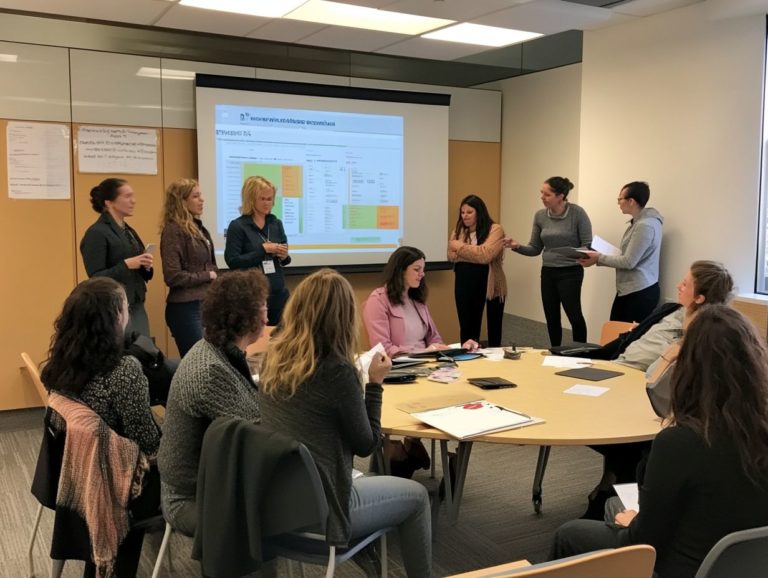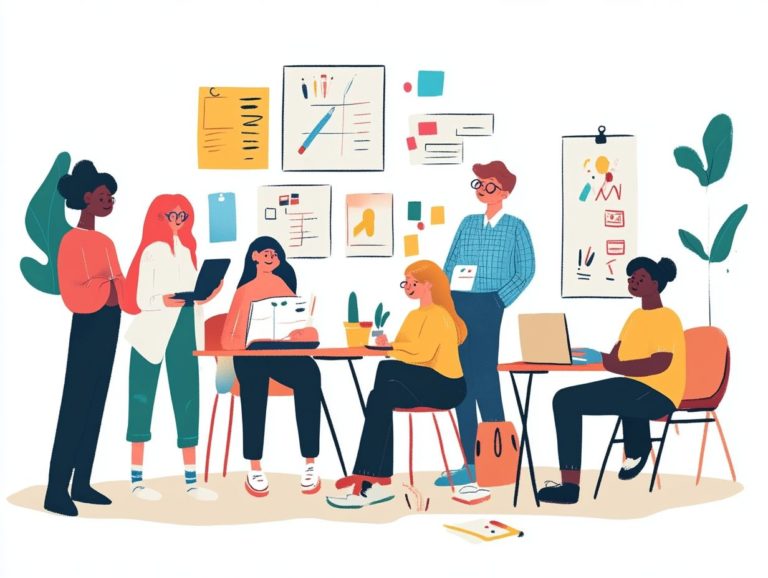10 Essential Skills for Career Advancement
In today s competitive job market, simply having technical expertise isn t enough to make you stand out. Mastering essential skills can unlock new career opportunities and foster significant professional growth.
This article delves into ten critical skills from effective communication to emotional intelligence that can dramatically enhance your career trajectory. You ll discover how to cultivate these skills, which industries prioritize them, and effective strategies for showcasing them during interviews.
By the end, you will grasp the lasting benefits of honing these abilities, setting yourself up for future success.
Contents
- Key Takeaways:
- 1. Communication Skills
- 2. Time Management
- 3. Adaptability and Flexibility
- 4. Leadership Skills
- 5. Problem Solving
- 6. Networking
- 7. Emotional Intelligence
- 8. Continuous Learning
- 9. Project Management
- 10. Teamwork and Collaboration
- How Can These Skills Help in Career Advancement?
- Frequently Asked Questions
- What are the 10 Essential Skills for Career Advancement?
- How can improving my communication skills help with career advancement?
- Why is adaptability an important skill for career advancement?
- How does emotional intelligence contribute to career advancement?
- What is the importance of continuous learning for career advancement?
- How can networking help with career advancement?
Key Takeaways:

- Great communication is key to climbing the career ladder as it enables individuals to convey ideas, build relationships, and collaborate with others.
- Time management helps you maximize productivity and stay accountable, making you a valuable asset for career growth.
- Adaptability and flexibility are vital skills in today’s ever-changing work environment, showcasing your ability to quickly adjust and thrive in new situations, which employers highly value.
1. Communication Skills
Effective communication skills are paramount for your personal and professional success. They not only elevate teamwork and collaboration but also play a pivotal role in developing emotional intelligence a trait increasingly treasured in today s workplace, as highlighted by studies from the Harvard Business Review and LinkedIn.
In various contexts, such as team dynamics, strong communication creates an environment where ideas can flow freely. This fosters collective brainstorming and innovation. When you and your team members openly share thoughts, you can swiftly identify issues and craft creative solutions, leading to outstanding project outcomes.
Sharpening these skills can be a game-changer for your career! Professionals who articulate their thoughts clearly tend to stand out during evaluations or interviews, positioning themselves to seize valuable networking opportunities. By building relationships through effective communication, you can significantly enhance your career trajectory, opening doors to collaborations that may have previously been out of reach.
2. Time Management
Time management is an essential skill. It enables you to maximize productivity and ensures personal accountability. By using methods like the Pomodoro Technique, where you work for a set time and then take a short break, you can allocate your time effectively.
Breaking your work into focused intervals followed by short breaks helps you maintain energy and concentration, ultimately leading to superior results. Prioritization is key, guiding you to identify the most important tasks needing immediate attention.
When you combine these strategies with a results-driven mindset, you enhance your efficiency and elevate your project management capabilities. Mastering time management cultivates greater professional agility, enabling you to pivot swiftly between tasks and adapt effortlessly to changing circumstances.
3. Adaptability and Flexibility
Adaptability and flexibility are crucial skills in today s dynamic workplace. They enable you to manage change with ease and leverage innovative digital technologies to boost your productivity.
When you adjust to new circumstances, you not only thrive in constant change but also position yourself as an invaluable team player. During a company merger, those who can swiftly acclimate to new corporate cultures often rise as leaders, guiding their colleagues through the transition.
As technology evolves, your willingness to embrace new tools and platforms can truly set you apart from your peers. This paves the way for career advancement and innovative opportunities. By fostering resilience through adaptability, you equip yourself to tackle challenges head-on, laying a strong foundation for success in even the most unpredictable environments.
4. Leadership Skills
Leadership skills extend far beyond just managing teams; they encompass emotional intelligence and relationship building. Both are vital for cultivating a positive work environment and achieving professional success.
As an effective leader, you demonstrate initiative by proactively identifying challenges and crafting solutions that resonate with your team. You possess a unique ability to understand and manage your own emotions while being deeply attuned to the feelings of others. This skill is essential for fostering an atmosphere of trust and collaboration.
You can sharpen these skills through mentoring relationships, where you receive guidance and feedback from seasoned mentors. This equips you to navigate complex relationships with others. Gaining real-world experience within organizations offers invaluable opportunities to practice these competencies. Ultimately, this enhances teamwork and creates a more cohesive organizational culture.
5. Problem Solving
Problem-solving skills are essential in today s intricate business landscape. You need careful thinking and creative ideas to tackle challenges effectively and harness your technology skills for optimal solutions.
In various scenarios, whether it s project management or product development, employing techniques like brainstorming, root cause analysis, and flowcharts can lead you to effective resolutions. Each of these methods brings unique benefits: brainstorming sparks creative solutions by fostering team collaboration, while root cause analysis allows you to dig deeper into issues, ensuring you address root problems rather than just their symptoms.
By enhancing your analytical abilities, you can approach challenges systematically. Make smart choices that solve today s problems and set you up for future success! This holistic approach cultivates a culture of continuous improvement within organizations, ultimately driving both productivity and innovation.
6. Networking

Networking is a game-changer that opens doors to endless opportunities! It allows you to build relationships, enhance your social awareness, and ultimately contribute to your professional success, as highlighted in various LinkedIn studies.
By connecting with a diverse range of individuals, you not only gain insights into industry trends and best practices, but also uncover mentorship opportunities that can significantly steer your career trajectory. Effective networking plays a crucial role in your personal growth, expanding your horizons and nurturing fresh ideas.
To establish and maintain strong networks, it s essential for you to engage actively on platforms like LinkedIn. Share relevant content and participate in discussions to enhance your presence. Attending industry conferences or local meetups allows you to forge face-to-face connections, reinforcing relationships that often blossom into fruitful collaborations and lasting friendships.
7. Emotional Intelligence
Emotional intelligence serves as a cornerstone of effective leadership for you. It encompasses self-awareness, social awareness, and the ability to navigate interpersonal relationships with finesse. This skill set paves the way for your professional success.
By cultivating emotional intelligence, you foster deeper understanding among colleagues and create an atmosphere of trust and collaboration. Recognizing and managing your own emotions enables you to respond thoughtfully instead of reacting impulsively, which enhances your communication.
Developing your emotional intelligence equips you with the tools to empathize with others, making it easier to unite around shared goals. In conflict situations, your high level of emotional intelligence enables you to facilitate resolutions effectively, ensuring that differences are addressed constructively. This ultimately boosts productivity and morale within your workplace.
8. Continuous Learning
Continuous learning is crucial in today s rapidly evolving digital landscape, enabling you to maintain a competitive edge through the acquisition of vital technology skills and the practice of professional agility, as highlighted in insights from the Harvard Business Review.
This concept transcends merely keeping up with industry trends; it nurtures adaptability and sparks innovation in your career. By engaging in continuous learning, you not only enhance your job performance but also unlock new opportunities for advancement.
Dive into learning opportunities that can transform your career! To achieve this, consider these methods:
- Pursuing formal education, such as degrees or certifications, provides you with structured knowledge and credibility that can set you apart.
- Alternatively, online courses offer the flexibility and accessibility you need, allowing you to learn at your own pace without compromising your other commitments.
- Seeking mentorship can offer invaluable insights and guidance from seasoned professionals, helping you navigate complex career paths with confidence.
Together, these approaches create a strong foundation for your ongoing personal and professional development.
9. Project Management
Effective project management is your secret weapon, seamlessly blending time management and teamwork to deliver results-driven outcomes. It ensures that your projects are completed efficiently while gracefully navigating any unexpected changes that may arise.
A successful project hinges on careful planning. This helps you set clear goals and timelines right from the start, involving breaking down the project into manageable tasks and effectively allocating resources.
Once you move into execution, this is where your team s skills really shine. They collaborate to tackle obstacles head-on and ensure deadlines are met.
Consistent monitoring is essential; it allows you to assess progress against the set benchmarks, enabling quick adjustments when needed.
Fostering open communication is key. It not only strengthens teamwork but also nurtures a shared commitment to achieving the project’s goals, making it a critical element in steering your project towards success.
10. Teamwork and Collaboration
Teamwork and collaboration are essential soft skills that lay the groundwork for a cohesive work environment, enabling you to forge strong relationships and drive professional success through collective efforts.
In both project-based settings and your daily operations, the ability to collaborate effectively allows you to tap into diverse perspectives, leading to innovative solutions and enhanced efficiency. Effective collaboration goes beyond simply working together; it s about cultivating an atmosphere where open communication, trust, and respect flourish.
To elevate your teamwork, it’s crucial to establish clear roles, set shared objectives, and engage in constructive feedback regularly. By honing soft skills like active listening, empathy, and conflict resolution, you can significantly boost your team s overall effectiveness, creating an environment where every member feels valued and motivated to excel.
How Can These Skills Help in Career Advancement?
Possessing essential skills such as communication, emotional intelligence, and adaptability can significantly enhance your career advancement opportunities, as supported by research from LinkedIn and the 7 skills every employee should master according to the National Association of Colleges and Employers (NACE).
These attributes not only improve your working relationships within the workplace but also bolster your ability to navigate challenges and embrace change with ease. For instance, a recent study revealed that 92% of employers prioritize communication skills in their hiring decisions.
Professionals who exhibit high emotional intelligence tend to be more likely to earn promotions; a report highlights that 90% of top performers have this critical skill set.
Adaptability is equally crucial, particularly in fast-paced industries where change is a constant. By cultivating these abilities, you position yourself not only to excel in your current role but also to seize emerging opportunities that will elevate your overall career trajectory.
Start enhancing these skills today to unlock your potential!
What Are the Top Industries That Value These Skills?

Several leading industries place a high premium on desirable skills like adaptability, teamwork, and problem-solving. These attributes contribute significantly to professional success and effective change management.
Take the technology sector, for instance. Here, these skills are a game-changer in today’s job market; they are essential for quick project adjustments, where rapid changes demand that you adapt swiftly and collaborate seamlessly with your team.
In healthcare, these abilities are invaluable. In patient care roles, the effectiveness of teamwork among medical professionals can significantly influence patient outcomes.
In manufacturing, problem-solving skills take center stage. They drive the optimization of processes and enhance productivity. Many organizations are embracing team training across different roles and ongoing professional development to cultivate these essential skills, ensuring they stay competitive.
How Can One Develop These Skills?
Developing essential skills demands your commitment to continuous learning and the guidance of mentoring relationships. This nurtures the emotional intelligence and professional agility necessary for workplace success.
To genuinely enhance these capabilities, actively pursue formal education opportunities, such as courses or certifications. These equip you with foundational knowledge and specialized expertise.
Engaging in mentorship programs provides invaluable insights and personalized feedback, enabling you to navigate challenges with confidence. Committing to self-analysis helps you identify your strengths and weaknesses.
Regular practice solidifies your new skills. Incorporating feedback into this iterative process is vital; it highlights improvement areas and reinforces your journey toward mastery.
What Are the Common Mistakes People Make in Developing These Skills?
Common mistakes often arise from a lack of self-awareness, ineffective practice, and underestimating the significance of emotional intelligence and problem-solving abilities.
Failing to identify your personal strengths and weaknesses can lead to misguided focus. If you follow a generic approach to skill development, you could stifle your growth and hinder your progress.
To overcome this, engage in self-reflection and seek feedback from peers or mentors. Incorporating diverse practice methods like simulations and real-world applications can enhance your retention and adaptability.
Emotional intelligence plays a vital role in this journey. Being attuned to your emotions and those of others can greatly improve your communication and teamwork, making it easier to navigate challenges.
How Can These Skills Be Showcased in a Job Interview?
Nailing your interview means showcasing your top skills boldly, like communication and problem-solving. This is crucial for demonstrating your professionalism, work ethic, and ability to meet employer demands.
To effectively convey these skills, prepare by practicing your responses to behavioral questions. These often reveal how you’ve handled various situations in the past.
Provide specific examples from previous roles to underscore your experiences. This can guide the interviewer through a compelling narrative of your achievements.
Connect your relevant experience to the job at hand. Illustrate not just what you did, but also the results you achieved like improved team performance or successful project completions. This approach highlights your competencies and reinforces your suitability for the role.
Key Takeaways:
- Commit to continuous learning and mentorship.
- Engage in self-reflection and seek diverse practice methods.
- Showcase your skills with specific examples in job interviews.
Ready to elevate your skills? Start your journey today!
What Are the Long-Term Benefits of Possessing These Skills?
Possessing essential skills not only elevates your immediate job performance but also brings long-term advantages such as sustainable professional success, adaptability in a dynamic workplace, and a commitment to lifelong learning.
As time goes on, a robust skill set can profoundly influence your career longevity. It enables you to navigate industry changes and stay relevant in your field. This resilience cultivates a sense of job satisfaction, as you feel increasingly competent and valuable.
Mastering these skills fosters personal growth. You can tackle new challenges and responsibilities. As you evolve, your confidence blossoms, unlocking opportunities that may have once felt out of reach. Ultimately, this leads to a more rewarding professional journey.
Frequently Asked Questions
What are the 10 Essential Skills for Career Advancement?

The 10 essential skills for career advancement are: communication, problem-solving, teamwork, adaptability, time management, leadership, critical thinking, networking, emotional intelligence, and continuous learning.
How can improving my communication skills help with career advancement?
Strong communication skills can boost your career! They help you build connections and tackle challenges head-on.
By continuously improving your communication skills, you can show good leadership and advance in your career.
Why is adaptability an important skill for career advancement?
In today’s fast-paced work environment, being adaptable is crucial. This skill allows you to quickly adjust to changes, take on new responsibilities, and thrive in different work environments.
Employers value adaptability as it shows you can handle challenges and stay productive.
How does emotional intelligence contribute to career advancement?
Emotional intelligence is about understanding your feelings and the feelings of others. This skill can help you build strong relationships and handle conflicts.
Employers value this skill in leaders, and it can lead to career advancement opportunities.
What is the importance of continuous learning for career advancement?
In today’s competitive job market, it’s essential to continuously learn and develop new skills. This shows your dedication to self-improvement and can make you a valuable asset to the company.
Continuous learning can also open up new opportunities for career advancement. Don t miss out on these skills they are crucial for advancing your career!
How can networking help with career advancement?
Networking is about building relationships and connections with professionals in your field. By networking, you can learn about new job opportunities and gain insights from experienced individuals.
This can ultimately lead to career advancement opportunities.






